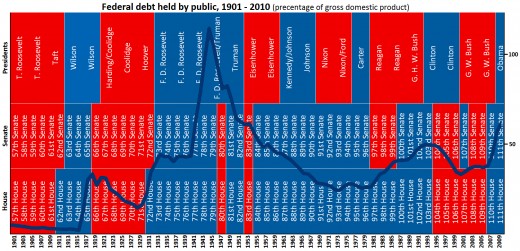Another Way to Explain "Deficit Spending, the Debt", a Balanced Budget Amendment, and Zen-Part 1 [165*10]
PUBLIC DEBT ACROSS ADMINISTRATIONS AND CONGRESS'

OOOHHHHUUUUMMMMM
I WAS THINKING ABOUT DEFICIT SPENDING the other day (boy, I lead a boring life, don't I) and came up with what I think is a different way to expain why President Obama faced such a challenge after assuming office. What I want to do is present a hypothetical situation which strips away a lot of the "noise" that hides part of the real issues which faced Obama on February 1, 2009.
Let us assume, for grins and giggles, that when President Obama took office, the American economy was in Conservative heaven, other than the worst recession since 1937 was about to take place. To begin with, pretend there was/were:
- no DEBT on January 1, 2008; America didn't owe a dime to anybody, which has occured servaral times in our history.
- no Budget DEFICIT on January 1, 2009; in other words, tax revenue each year exactly equaled cash outlays for all government discresionary and non-discresionary programs.
- a Balance Budget Amendment in place similar to the on proposed by the Conservatives
- no additional increases in outlays planned for outyear budgets.
Assume further that the all of the precursors to the 2008 recession have taken place and the recession started as it actually did, in late December, 2007. I will also use actual budget numbers from that period.
Revenue (2005 $T)
| Outlays (2005 $T)
| Deficit (2005 $T)
| Debt (2005 $T)
| |
|---|---|---|---|---|
2007 (Bush)
| $2.41
| $2.41
| $0
| $0
|
2008 (Bush)
| 2.29
| 2.41
| -.12
| -.12
|
2009 (Obama)
| 1.90
| 2.41
| -.51
| -.63
|
2010 (Obama)
| 1.93
| 2.41
| -.48
| -1.11
|
2011 (Obama)
| 2.00
| 2.41
| -.41
| -1.52
|
TABLE 1
Note that the Revenues in the table above are real. The actual Outlays for 2007, in 2005$, was $2.57 trillion, however, I am going to pretend we have a balanced budget and limit spending to $2.41 trillion. OK, what can we discern from this simple table, given a starting point every conservative, every American really, would like to start from in 2008?
- Without lifting a finger, Bush finds himself with a $120 billion deficit and debt of the same amount by the end of his term
- Obama, if he let's the recession run its course and it miraculously follows the course it actually did, will have a budget deficit of $410 billion and a public debt of $1.5 trillion ... just by sitting there and doing absolutely nothing! (in reality, if he were to have done that, the deficit and debt would be much, much larger because the recession would have deepened)
But wait, there is more interesting things to add ... like interest on the debt. Let's readjust our table to account for this new variable, assuming a 3% interest rate.
Revenuess (2005 $T)
| Outays (2005 $T)
| Deficit (2005 $T)
| Interest (2005 $T)
| Debt (2005 $T)
| |
|---|---|---|---|---|---|
2007
| $2.41
| $2.41
| $0
| $0
| $0
|
2008
| 2.29
| 2.41
| -.12
| 0
| -.12
|
2009
| 1.90
| 2.41
| -.51
| -.0004
| -.6304
|
2010
| 1.93
| 2.41
| -.48
| -.019
| -1.13
|
2011
| 2.00
| 2.41
| -.41
| -.039
| -1.58
|
TABLE 2
Now, President Obama has an additional $58 billion problem just because of interest on the new debt.
Keep in mind this $1.58 trillion is 39% of the $4 trillion increase in the public debt President Obama is getting blamed for being the cause. The question is, "where did all of this new debt and budget deficit come from?" It certainly wasn't from excess government spending because that was one of the assumptions, Obama could not spend any additional dollars beyond those in 2007. Since I have kept this example very simple, I have left you only one other choice - "the loss of tax revenue resulting from the recession."
That is quite a number, that 39%. What is more, it really does reflect reality even though the situation I presented appears to be artificial! Why? Because, I structured it such that, for this type of analysis, i.e., considering the effect of revenue loss, it is not. It is not, because I isolated revenue's influence and I used a real-life starting position and a real-life revenue stream From there, I held everything else constant to see what happens.
And what happened was pinning approximately 39% of Obama's debt problem directly to the loss of revenue caused by the recession from the previous administration; this amount of debt was going to happen regardless of what President Obama, or any other President, did or didn't do.
Now, let me walk that last paragraph back a tiny bit by saying that IF revenue loss were the only factor being considered, then the word "regardless" is somewhat overstated because there are possibly actions a president might have been able to take to mitigate the harm. However, there were other factors. One of those factors, unemployment, falls into the same category as revenue loss..
ECONOMIC STABILIZERS
UNEMPLOYMENT PAYMENTS IS JUST ONE component of a set of economic measures which automatically come into play when the economy goes south; together they are called "economic stabilizers". Unemployment, food stamps, and other welfare support system automatically kick in when masses of people begin losing jobs. They are not anything a President or a Congress have control over, in the short run; they will happen.
So, let's add them to our table and see what happens. (These are CBO data their study called, appropriately, "The Effects of Automatic Stabilizers on the Federal Budget", April 11, 2011.)
Revenues (2005 $T)
| Outlays (2005 $T)
| Deficit (2005 $T)
| Economic Stabilizer (2005 $T)
| Interest (2005 $T)
| DEBT (2005 $T)
| |
|---|---|---|---|---|---|---|
2007
| $2.41
| $2.41
| $0
| $.003
| $0
| $.003
|
2008
| 2.29
| 2.41
| -.12
| -.024
| 0
| -0.14
|
2009
| 1.90
| 2.41
| -.51
| -.286
| -0.004
| -0.93
|
2010
| 1.93
| 2.41
| -.48
| -.324
| -0.028
| -1.76
|
2011
| 2.00
| 2.41
| -.41
| -.288
| -0.053
| -2.52
|
TABLE 3
Sooo, what have we now discovered on our little sojourn into my world of numbers, data, and analysis, far from the reaches of sound bytes and hyperbole? We have determined that there are two sources of new debt that will occur for any economic downturn for which subsequent politicians have no control, they are:
- The increasing deficit and debt resulting from the loss of tax revenue do to the slowing economy
- The increasing "economic stabilization" costs resulting from the economic impact of large job loss across the country.
As a consequence, we discovered that for the 2008 recession, using the applicable numbers, there is a minimum of $2.5 TRILLION in new debt that was going to be attributed to President Obama regardless, for the most part, of what he did, good or bad or not at all! $2.5 Trillion folks, out of the $4 Trillion is what he is erroneously being pummeled with!!
Said another way, one of President Bush's long-term legacies (actually I don't blame Bush, the man, rather, I blame the conservative economic system) is a $2.5 trillion bill to pay as a result of conservative economic policies put in place over the previous 14 years (including the 6 years conservatives had total control of Congress under Clinton). Because this debt, this $2.5 trillion, is a function of the recession, and not subsequent Executive or Congressional activity, it therefore needs to be taken off the table in any intelligent discussion of how President Obama has handled the recovery and fallout after the nuclear explosion did its damage.
OK, so what are we left with? $1.5 trillion, of course. An interesting number that is for it is roughly the amount of stimulus Obama was able to get through Congress to prime the economy, in accordance to Keynesian economic theory. It is this debt for which Obama must be judged a success or failure; the remainder is simply a present from the Conservatives.
WHAT DO YOU THINK?
Do You Believe The First $2.5 Trillion of the $4 Trillion Debt is Due to President Obama's Policies?
DEMOGRAPHIC SURVEY #1
Do you consider yourself more closely aligned with the
DEMOGRAPHIC SURVEY #2
Are You
- Tax Cuts Spur GDP Growth? Oh Really! Let's Just Take...
The Conservatives say tax cuts ALWAYS spur growth but the REAL answer is IT DEPENDS on the situation. This hub looks at when tax cuts work and when they don't. - Another Look At Why Spending Cuts ALONE Will Simply ...
A hopefully understandable, yet somewhat technical (lots of charts) look at why it is simply impossible to balance the books by spending cuts alone. - The Stimulus Can Giveth and the Budget Cut Can Taket...
Virtually all economists agree, Government stimulus', when properly used, do work. Virtually all economists also agree, ill-timed budget cuts can drive the economy into recession. This hub looks into both phenomenon. - On Principle and Pragmatism IIIc - Plato, Washington...
The foundation for the U.S. Constitution stretch all the way back to 400 B.C. Our Founding Fathers read extensively of the works of Plato and Aristotle. These two great thinkers, among others, had great influence on what our government looks like tod - On Principle and Pragmatism IIIa - Plato, Washington...
The foundation for the U.S. Constitution stretch all the way back to 400 B.C. Our Founding Fathers read extensively of the works of Plato and Aristotle. These two great thinkers, among others, had great influence on what our government looks like tod - On Principle and Pragmatism II - Ratification of the...
Most Americans, including most Conservatives and Tea Party types, as well as Democrats, are not aware how close we came to not having an America at all. Roughly 50% of colonialists wanted something more like the what the European Union is today, exce - On Principle and Pragmatism IV - What do Plato, Aris...
What are the philosophical underpinnings of the Democratic and Republican political theories; they have very deep roots going back to 400 B.C.E. and two of the most famous thinkers in history. Come read. - On Principle and Pragmatism VIII - Understanding the...
How Americans think about why the Constitution was written drives which political party and candidate they ultimately vote for, or even if they vote at all. This set of polls is to help determine what those views are, by political philosophy so that - On Principle and Pragmatism Vc: What Does Limited Go...
This is another in my series on Priciple and Pragmatism which looks at American Constitutional History and tries to apply it to today. This Hub, - On Principle and Pragmatism Va: What Does Limited Go...
This is another in my series on Priciple and Pragmatism which looks at American Constitutional History and tries to apply it to today. This Hub, - On Principle and Pragmatism Vb: What Does Limited Go...
This is another in my series on Priciple and Pragmatism which looks at American Constitutional History and tries to apply it to today. This Hub, - On Principle and Pragmatism IIIb - Plato, Washington...
http://myesoteric.hubpages.com/hub/On-Principles-and-Pragmatism-IIIb-Plato-Washington-Adams-Jefferson-and-the-US-Constitution-81 - On Principle and Pragmatism VI: What is the Role of ...
Marbury v. Madison is probably not very well known amongst the U.S. citizenry even though it has had one of the biggest impacts on American lives in our history.









